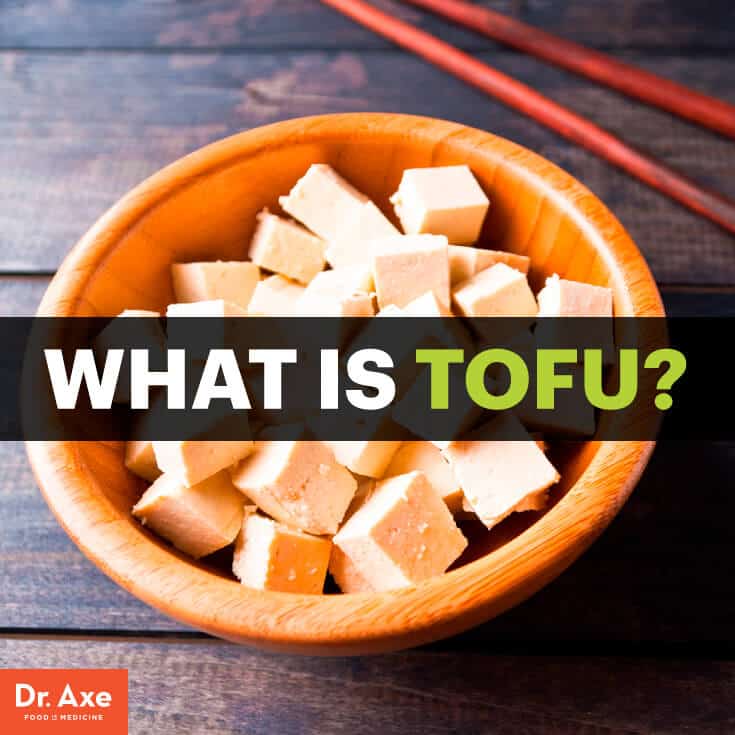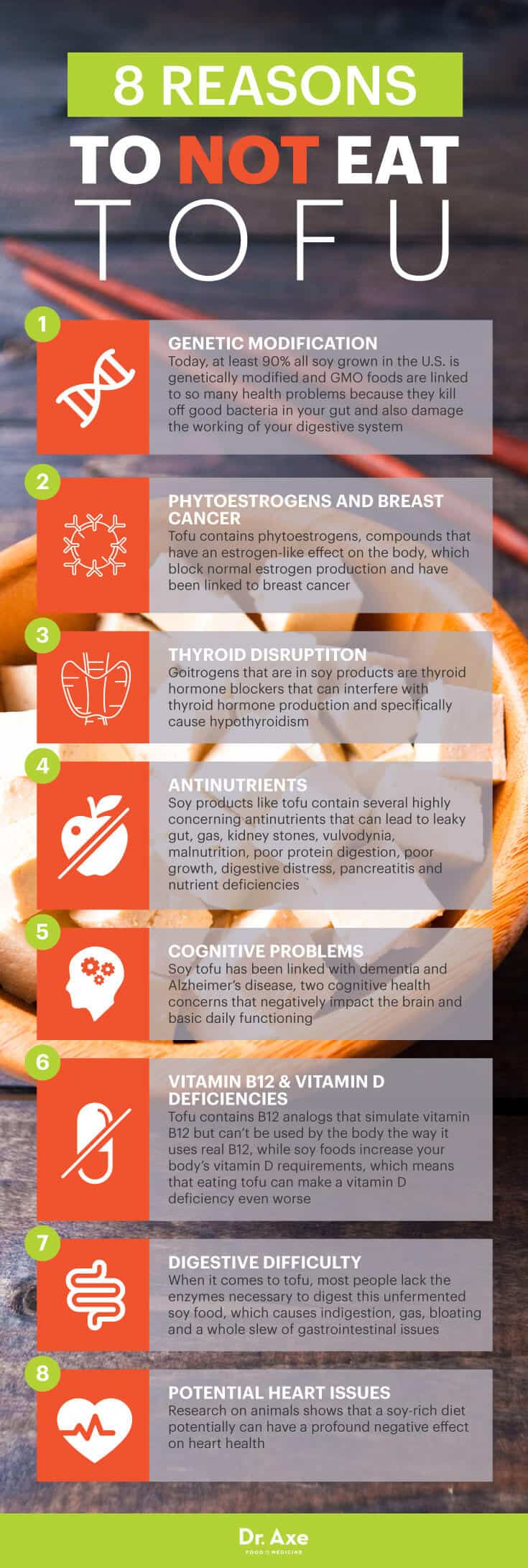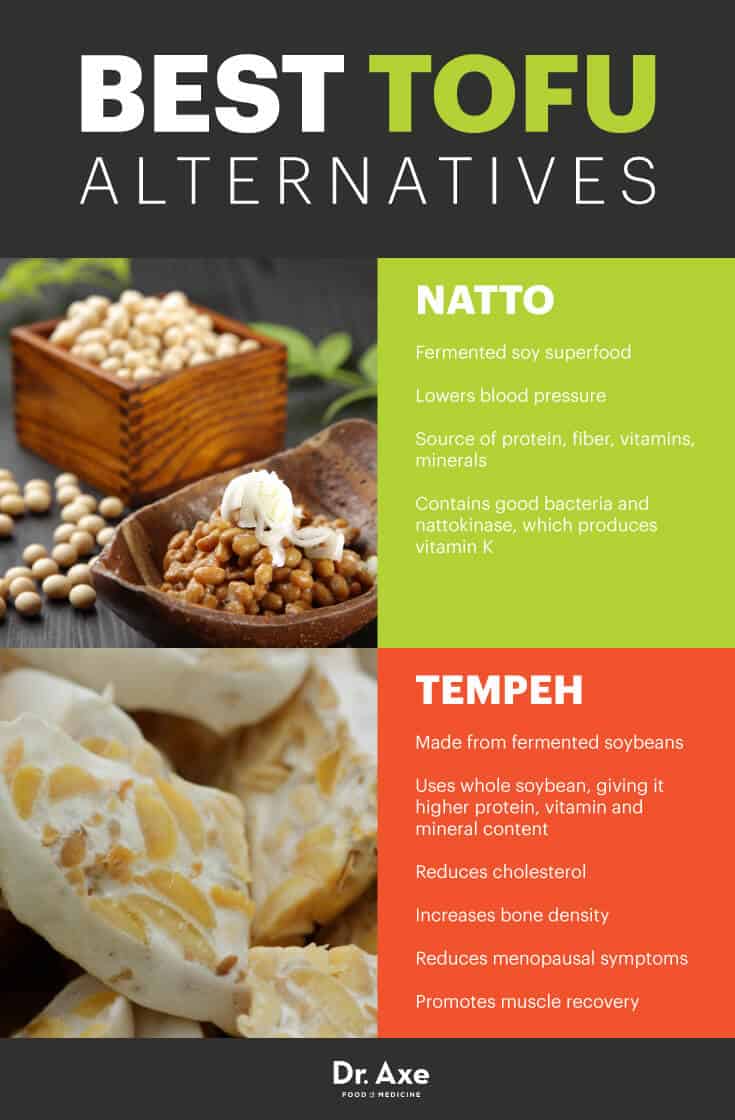October 5, 2016

Tofu, also called bean curd, has gained popularity over the years especially as a vegetarian- and vegan-approved source of protein. It seems to have a healthy reputation with consumers, but what is tofu exactly? The truth is tofu is made from soy, and the majority of the time soy is bad for you.
Soy is actually one of the most commonly genetically modified foods in the world, and tofu is made from soybeans, water and a coagulant, or curdling agent. According to Dr. Kaayla Daniel, author of “The Whole Soy Story,” soy is not a health food, does not prevent disease and has not even been proven safe. Furthermore, numerous scientific studies link soy to digestive troubles, malnutrition, thyroid dysfunction, cognitive decline, reproductive disorders, as well as heart disease and cancer. (1)
These are some of the main reasons why soy protein makes my list of the 10 health foods you should never eat. But is all soy bad? The important thing to know is that soy products fall into two groups: fermented or unfermented. Unfermented soy products include tofu, edamame and soy milk, while miso, natto, tempeh and tamari are fermented soy products. All soybeans (even organic, non-GMO ones) naturally contain antinutrients, toxins and plant hormones. However, fermentation is what makes soy products health-promoting. Without fermentation, what is tofu? It’s just a rubbery, white piece of questionable and health-hazardous non-meat protein.
People often wonder what is tofu made of? It makes perfect sense why tofu is often called bean curd since it’s made by curdling soy milk (from soybeans) and then pressing the resulting curds into soft, white blocks. The process of making tofu is relatively similar to the way that cheese is made from milk. Tofu nutrition is impressive, and that’s why many people assume it’s such a great health food. Per serving, it’s low in fat and calories yet high in protein, amino acids, iron and calcium. (2) So what is tofu’s downside? I’ll tell you why gaining these nutrients from eating tofu is not worth the negative repercussions below.
There are actually many different types of tofu, including fresh tofu, soft or silken tofu, firm tofu, extra firm tofu, processed tofu, fermented tofu, dried tofu, fried tofu, and frozen tofu. The healthiest options on this list are the fermented varieties, which include pickled tofu and stinky tofu. Pickled tofu, also known as preserved tofu or fermented tofu, consists of dried tofu cubes that have been allowed to fully air-dry under hay and slowly ferment from aerial bacteria. Stinky tofu is a soft tofu fermented in a vegetable and fish brine. Unfortunately, most of the tofu eaten in the United States is unfermented, and unfermented tofu really shouldn’t be consumed.
1. Genetic Modification
In 1994, the first genetically modified soybean was introduced to the U.S. market by Monsanto. While food prices continue to rise around the world, the availability of non-GMO soybeans is decreasing, which is leading more Asian and U.S. food manufacturers in Asia to use genetically modified soybeans to make soy foods like tofu. Today, at least 90 percent all soy grown in the United States is genetically modified. (3) This is such an alarmingly high amount that it’s no wonder it’s so challenging to find soy products that are non-GMO.
Thanks to Monsanto, the leading producer of GMO foods in the U.S., the majority of soy products are made from Monsanto Roundup Ready Soybeans. These soybeans are genetically engineered in such a way that their DNA is changed so the soybean plants can withstand the herbicide glyphosate, which is the active ingredient in Monsanto’s herbicide Roundup. First grown commercially in 1996, Roundup Ready Soybeans allow farmers to spray their entire crops with glyphosate to kill the weeds but not damage the soybean crops. (4)
Genetically modified foods are linked to so many health problems because they kill off good bacteria in your gut and also damage the working of your digestive system. In a 2011 review published in Environmental Sciences Europe, 19 studies of mammals, fed GMO soybeans and corn, were evaluated. The 90-day trials indicate liver and kidney problems as a result of consuming GMO foods. Kidneys were specifically affected by 43.5 percent of all disrupted parameters in male subjects while the liver was disrupted by 30.8 percent for the females. (5) It’s actually become harder to find this original study since its publication. I’m sure that’s because it makes people highly concerned about consuming genetically modified foods like tofu.
How scary that eating GMO foods can so directly and majorly impact our vital organs! Even if you buy tofu that is not made from genetically modified soybeans, there is still a variety of other substantial health concerns.
2. Phytoestrogens and Breast Cancer
Tofu contains phytoestrogens — or plant-based estrogens. These compounds have an estrogen-like effect on the body so they block normal estrogen production and have been linked to breast cancer. Some scientific research finds that soy might “feed” certain breast cancers since it can behave just like estrogen. It might depend on how much soy is consumed as well as the overall health of the woman, but if you have breast cancer currently, are a survivor of breast cancer or you have a family history of breast cancer, I would definitely avoid tofu and other unfermented soy products entirely. (6)
3. Thyroid Disruption
Tofu is made from soy, and soy contains goitrogenic compounds, specifically the soy isoflavone genistein. These goitrogens are thyroid hormone blockers that can interfere with thyroid hormone production and specifically cause hypothyroidism.
Many parents think they’re making a healthy choice when they opt for soy formula for their babies. Unfortunately, this couldn’t be further from the truth. A study published in the Archives of Disease in Childhood shows how the intake of soy products can negatively affect us starting at a very early age, especially for people born with congenital hypothyroidism. As this 2004 study shows, infants fed soy formula have a prolonged increase of thyroid stimulating hormone compared to infants fed non-soy formula. (7)
An earlier study in 1994 showed similarly concerning results. A patient with congenital hypothyroidism continued to be “persistently hypothyroid” while on a soy formula diet even though the patient was receiving large doses of L-thyroxine (T4). (8) T4 is a standard conventional treatment for hypothyroidism.
4. Antinutrients
Tofu contains phytate, which science has shown contributes to the firm texture of tofu. (9) Phytate is essentially phytic acid bound to a mineral. What’s the problem with phytate? Well, phytate and phytic acid are known antinutrients, and they aren’t the only antinutrients in tofu. Soy products like tofu contain several highly concerning antinutrients, including: (10)
When it comes to tofu, cooking it does not seem to reduce the level of phytates and other antinutrients. What does reduce these antinutrients is fermentation.

5. Cognitive Problems
Soy tofu has been linked with dementia and Alzheimer’s disease, two cognitive health concerns that negatively impact the brain and basic daily functioning. One ongoing study of Japanese Americans residing in Hawaii found a significant statistical relationship between two or more servings of tofu per week and “accelerated brain aging.” Additionally, the study subjects who ate tofu in mid-life had lower cognitive function in the later years of their lives. They also had an increased occurrence of both dementia and Alzheimer’s disease. (11)
According to a study published in Dementia and Geriatric Cognitive Disorders, eating high amounts tofu was linked to a worse memory while eating high amounts of tempeh was shown to improve memory. The researchers hypothesize that tempeh’s high folate levels have protective and counteractive effects on phytoestrogen content. (12)
6. Vitamin B12 and Vitamin D Deficiencies
Soy contains a B12 analogs, which means that tofu contains compounds that resemble vitamin B12. However, these B12 analogs cannot be used by your body the way it would use real B12. This is why soy foods like tofu can actually contribute to vitamin B12 deficiency, especially among people who avoid animal protein like vegetarians and vegans.
You probably already knew how widespread vitamin D deficiency is in this country, but you probably didn’t know that unfermented soy foods are part of the problem. Soy foods like tofu also increase your body’s vitamin D requirements, which means that eating tofu can make a vitamin D deficiency even worse. (13)
7. Digestive Difficulty
Unfermented soy products like tofu contain strong enzyme inhibitors, which block the action of the pancreatic enzyme trypsin along with other proteolytic enzymes needed for protein digestion. This not only disrupts a healthy digestive process, but can also causes problems with the pancreas.
I’ve written a lot about how crucial digestive enzymes are to our overall health and well being. When it comes to tofu, most people lack the enzymes necessary to digest this unfermented soy food, similarly to how many people are lactose intolerant. This causes indigestion, gas, bloating and a whole slew of gastrointestinal issues.
Many people also have soy sensitivities or even full-blown allergies due not only to the genetic modification of soy, but also due to overexposure since soy is lurking in many more products than we realize.
8. Potential Heart Issues
While tofu is often marketed as a heart-healthy alternative to animal meats, there have been studies that definitely debunk this claim. One such study was done with animal subjects, and the results were highly interesting.
Researchers specifically looked at the effect of a soy-rich diet on hypertrophic cardiomyopathy (HCM), a condition in which the heart muscle becomes abnormally thick and makes it hard for the heart to pump blood. The study published in the Journal of Clinical Investigation found that mice fed a soy diet exhibited significantly worse HCM than mice fed a soy-free (milk protein) diet. These study results provide evidence that a soy-rich diet can have a profound negative effect on heart health. (14)
If you’re looking for a healthier go-to meatless protein source, here are some great alternatives to tofu:
Natto — Natto is a fermented soy superfood that’s been shown in scientific studies to have great health benefits, including lowering blood pressure. (15) Natto is as an excellent source of protein, fiber, vitamins and minerals. Additionally, the good bacteria Bacillus subtilis in natto creates an enzyme called nattokinase, which produces vitamin K2.
Tempeh — Tempeh is also made from fermented soybeans. Its fermentation process as well as its use of the whole soybean gives it a higher content of protein, vitamins and minerals. Tempeh is is known to reduce cholesterol, increase bone density, reduce menopausal symptoms and promote muscle recovery. In addition to these amazing benefits, tempeh has the same protein quality as meat and contains high levels of vitamins B5, B6, B3 and B2.
These are both made from soy, yes, but, they’re fermented foods, which is the key differentiator. Next time you come across some tasty-sounding tofu recipes, remember these alternatives that you can substitute for tofu.
Tofu, or “doufu” as the Chinese call it, got its start centuries ago in China. The making of tofu was first recorded during the Han Dynasty (between 206 B.C. and 220 A.D.) about 2,000 years ago. Some say it was discovered by a Chinese cook who accidentally curdled soy milk when he added nigari seaweed. (16)
It took hundreds of years before Japan got in on the action. When the Japanese started making the bean curd, they called it “tofu” as we do in America today. Tofu’s creation and consumption continued to advance throughout Asia over the years. The spread of tofu corresponded with Buddhism’s spread since tofu is a common source of protein in the vegetarian diet of East Asian Buddhism.
Tofu didn’t make its way to the U.S. until 1765 when a man named Samuel Bowen, a well-traveled sailor, settled near Savannah, Ga. and planted soybeans for his employer at the time. A few years later in 1770, Ben Franklin sent soybeans (he called them “Chinese caravances”) back from France to his friend and famous botanist, John Bertram. Franklin wrote in excitement to Bertram about a “special cheese” made from the beans “which is called Tau Fu.” (17)
The soybean became a commercial crop in the United States in the 1920s, but back then soy wasn’t for eating. It was used as hay and sometimes green manure. Consumption of soybean products began in this country during World War II. This was when the soybean crop replaced imported fats and oils that were being blocked by disrupted trade routes due to the war.
In the 1960s, soybean production was booming in the U.S., which was producing 75 percent of the world’s supply at that point. Medical studies began around this time too, and they continue to this day. (18) Many studies talk about positive health benefits of eating soy foods, but you have to keep in mind that soybeans make a lot of money for a lot of people. From 1996 to 2013, annual soy food sales in the U.S.increased from $1 billion to $4.5 billion. (19)

Traditional Asian diets rich in fermented soy products definitely have their health benefits. Unfortunately, the majority of the time that we eat soy in this country, it’s the unfermented variety like tofu, and it’s in too large of a quantity. What is tofu? It’s typically an unfermented soy product that’s genetically modified, offsetting the potential health benefits.
I strongly recommend avoiding unfermented soy products like tofu for the sake of your health. Fermented soy products like natto have been shown to have positive health effects like lowering blood pressure, but unfermented soy like tofu has been linked to digestive troubles, malnutrition, thyroid dysfunction, cognitive decline, reproductive disorders, as well as heart disease and cancer.
Even though experts might keep claiming tofu is a healthy alternative to meat, I really hope you’ll think twice next time you’re choosing your vegetarian protein — and if it’s going to be soy, make sure it’s fermented.